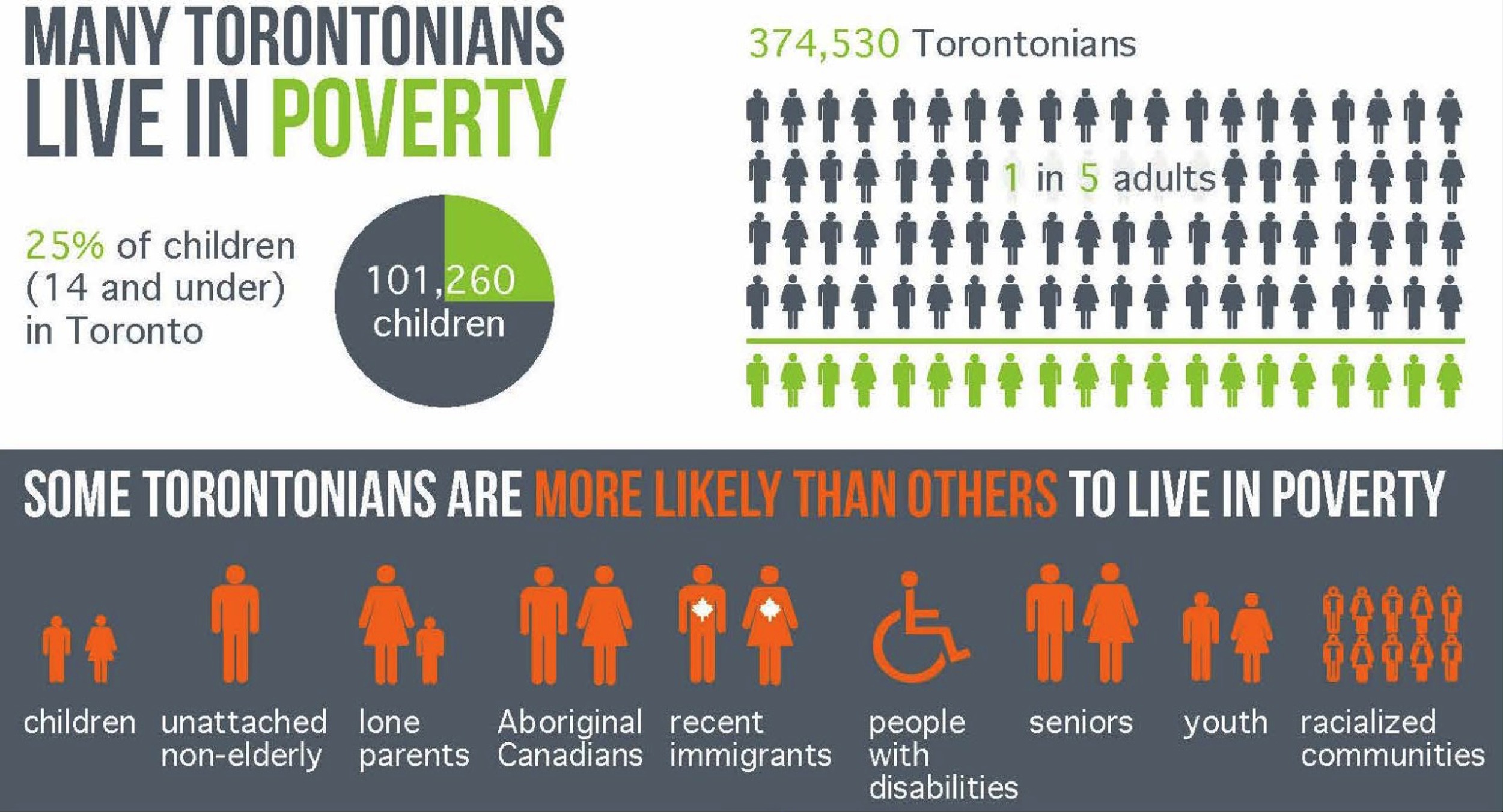A municipal strategy to reduce urban poverty addresses the roots of inequality
 Like many major metropolitan areas in the United States, Toronto is experiencing fast-paced growth. Canada’s finance and business capital has more cranes in the sky than New York City—with nearly 50 percent more high-rises undergoing construction than in the big apple. Between 1990 and 2012, the region experienced a doubling of the economy, and significant population growth. By 2013, Toronto had become the fourth largest city in North America and today, almost one fifth of all Canadians live in the metropolitan area.
Like many major metropolitan areas in the United States, Toronto is experiencing fast-paced growth. Canada’s finance and business capital has more cranes in the sky than New York City—with nearly 50 percent more high-rises undergoing construction than in the big apple. Between 1990 and 2012, the region experienced a doubling of the economy, and significant population growth. By 2013, Toronto had become the fourth largest city in North America and today, almost one fifth of all Canadians live in the metropolitan area.
 Amidst such frenzied development and economic growth, however, many have been resigned to the margins:
Amidst such frenzied development and economic growth, however, many have been resigned to the margins:
- One in four children and one in five adults live in poverty;
- Almost half of Greater Toronto Area workers have temporary, contract, part-time jobs with variable hours, little stability, and no benefits;
- Almost one in four college graduates are working low-wage jobs; and
- Almost half of all recent immigrants live in poverty.
As Toronto’s population and economy grew, so did levels of income inequality. Over a 25 year period, household income inequality grew 31 percent—more than double than that of the country as a whole. Between 1970 and 2005, the number of low-income neighborhoods grew from 19 to 53 percent, while the number of middle-income neighborhoods decreased from 66 to 29 percent
Toronto recognizes that it must combat structural inequalities that prevent specific demographics from escaping poverty. Above are two infographics featured in conjunction with Toronto’s report, TO Prosperity: Toronto Poverty Reduction Strategy, a comprehensive endeavor to change the economic paradigm for all Toronto residents.
Despite such grim conditions and trends, the City is working toward solutions. Having reached “consensus that [Toronto] do[es] not want growing inequity, and that a collaborative, community-driven strategy is needed to end poverty,”on November 3, 2015, Toronto’s City Council voted unanimously to adopt “TO Prosperity: Toronto Poverty Reduction Strategy.” The City’s first ever comprehensive anti-poverty plan aims to address some of the most difficult societal issues: rising inequality and the concentration of poverty.
The City intends to become, by 2035, “a city with opportunities for all,” in which “everyone has access to good jobs, adequate income, stable housing, affordable transportation, nutritious food, and supportive services.” To do so, the City will follow a groundbreaking new anti-poverty plan, which provides guidance on how it can meet residents’ immediate basic needs as well as create more permanent pathways to prosperity. The strategy comes after months of planning, with over 100 meetings in stakeholding communities, 10 facilitated dialogues, and hundreds of online surveys to collect suggestions from those who would benefit most. In addition, a network of more than 75 community groups convened a session called “Commitment 2 Community,” in which they outlined their recommendations for the budget allocation in the Strategy’s implementation process, which will take place over the next three years, to ensure not just short-term solutions, but long-term success.
After consulting with experts and community members alike, the City crafted a meticulous plan to reduce poverty that tackles some of its major symptoms, while also getting at the root of the problem. For instance, the City strives first to ensure that all children have the opportunity to thrive, that wages are held to higher standards for all residents, that families have access to healthy food, and that public transit serves those who depend on it most. Meanwhile, the City’s strategy simultaneously echoes the “Community 2 Community” call for systemic solutions. As the report states, “Why expect different results if we continue doing things the same way?”
A principal tenet of the report and implementation strategy is the focus on driving systemic change in tackling inequality. Consequently, in addition to the strategies that tackle the symptoms of poverty, the City is dedicated to shaping its strategies for poverty reduction such that reversing systemic inequality (and the propensity for minorities and women to suffer from poverty more than others) is at the core of all government operations. Their strategy recognizes that the foundations of a new economy rooted in local investment, ownership, and purchasing patterns will be the deciding factor in bringing the City’s vision of “justice, fairness and equity” to fruition. To that end, over the next three years, the City’s specific recommendations that will help reorient the Toronto economy towards community wealth building include:
- Design and implement a community benefits program for City purchasing and capital investments;
- Design and implement a procurement policy, preferencing local, as well as minority- and women-owned business; and
- Connect job seekers, start-up businesses, and worker-owned co-operatives with economic opportunities, through collaborations with local anchor institutions.
Though the initiative is in its early stages, Toronto is poised to become another leading city that is building community wealth. The City acknowledges that “[e]nding poverty needs an accountable and participatory government that recognizes that everyone has a part to play. Residents, community and business partners, labour, and other orders of government will need to devote time, energy, and resources to build a prosperous and inclusive Toronto.”
How will the city accomplish this goal? Toronto joins a wave of North American municipalities from Cleveland, Ohio to Richmond, Virginia, piloting and implementing community wealth building policies and strategic actions, from which it can draw many lessons and tactics to combat inequality on a systemic level. Much research has been completed on opportunities to leverage local anchor spending from place-based institutions (such as University of Toronto and Toronto General Hospital) to connect both local job-seekers and worker-owned cooperatives with economic opportunities. Toronto’s newly developed strategy also aims to funnel resources from private economic development for community benefit, a growing trend in many U.S. cities. It remains to be seen whether the city will fund this $75 million initiative, but with current advocacy by civic leaders, we remain hopeful.
Toronto’s rapid urban growth presents an opportunity for change. Photo: Creative Commons Public Domain
Originally published on December 14, 2015 by Community-Wealth.org
 Michelle Stearn began working at the Democracy Collaborative as a Communications Associate in Fall 2015 after graduating from Georgetown University with a Bachelor’s degree at the School of Foreign Service. Her studies focussed on environmental justice, globalization, and critical theory. She also studied sustainable community development and urban agronomy for a semester in Santiago, Chile, where her Spanish accent became quite distinctive.
Michelle Stearn began working at the Democracy Collaborative as a Communications Associate in Fall 2015 after graduating from Georgetown University with a Bachelor’s degree at the School of Foreign Service. Her studies focussed on environmental justice, globalization, and critical theory. She also studied sustainable community development and urban agronomy for a semester in Santiago, Chile, where her Spanish accent became quite distinctive.
 Violeta Duncan began working for the Democracy Collaborative as an Associate, Community Wealth Building Research & Strategy in May of 2014. She received her undergraduate degree from Washington University in St. Louis and her master’s degree in urban planning from Columbia University, where she concentrated on participatory planning and local procurement practices in Kenya. Duncan assists in the production of the monthly Community-Wealth.org newsletter and maintains the Community-Wealth.org blog, in addition to supporting feasibility studies and other community wealth building research.
Violeta Duncan began working for the Democracy Collaborative as an Associate, Community Wealth Building Research & Strategy in May of 2014. She received her undergraduate degree from Washington University in St. Louis and her master’s degree in urban planning from Columbia University, where she concentrated on participatory planning and local procurement practices in Kenya. Duncan assists in the production of the monthly Community-Wealth.org newsletter and maintains the Community-Wealth.org blog, in addition to supporting feasibility studies and other community wealth building research.
 A five-year, $5 million commitment from the Co-operative Retailing System (CRS) will provide critical start-up funding for Co-operatives First, an organization that will facilitate a new wave of co-operative development in Western Canada.
A five-year, $5 million commitment from the Co-operative Retailing System (CRS) will provide critical start-up funding for Co-operatives First, an organization that will facilitate a new wave of co-operative development in Western Canada.


 2016 is shaping up to be an exciting year for social enterprise in Manitoba. The latest development was announced last week: the Manitoba government has committed to supporting employment-focused social enterprises through the development of a $10 M loan fund, as well as developing a government-wide social impact procurement strategy.
2016 is shaping up to be an exciting year for social enterprise in Manitoba. The latest development was announced last week: the Manitoba government has committed to supporting employment-focused social enterprises through the development of a $10 M loan fund, as well as developing a government-wide social impact procurement strategy. Blog by: Darcy Penner
Blog by: Darcy Penner Unlimited Sun Fuel + Community Owned Solar Farm = Power to the People!
Unlimited Sun Fuel + Community Owned Solar Farm = Power to the People! The Manitoba government will establish a new $10-million loan fund to support social enterprise, creating more employment and training opportunities for people who face barriers to work, Housing and Community Development Minister Mohinder Saran announced last week at the sod-turning of a new 19-unit multi-family housing project that will be built, in part, through social enterprise.
The Manitoba government will establish a new $10-million loan fund to support social enterprise, creating more employment and training opportunities for people who face barriers to work, Housing and Community Development Minister Mohinder Saran announced last week at the sod-turning of a new 19-unit multi-family housing project that will be built, in part, through social enterprise.

 Congratulations to
Congratulations to  The Canadian Alternative Investment
The Canadian Alternative Investment The federal government has released an open invitation for pre-budget submissions from Canadians in advance of the 2016 Federal Budget. The government has not set a date for the finalized budget but it will likely be published before the end of the fiscal year (March 31).
The federal government has released an open invitation for pre-budget submissions from Canadians in advance of the 2016 Federal Budget. The government has not set a date for the finalized budget but it will likely be published before the end of the fiscal year (March 31). Like many major metropolitan areas in the United States, Toronto is experiencing fast-paced growth. Canada’s finance and business capital has more cranes in the sky than New York City—with nearly 50 percent more high-rises undergoing construction than in the big apple. Between 1990 and 2012, the region experienced a doubling of the economy, and significant population growth. By 2013, Toronto had become the fourth largest city in North America and today, almost one fifth of all Canadians live in the metropolitan area.
Like many major metropolitan areas in the United States, Toronto is experiencing fast-paced growth. Canada’s finance and business capital has more cranes in the sky than New York City—with nearly 50 percent more high-rises undergoing construction than in the big apple. Between 1990 and 2012, the region experienced a doubling of the economy, and significant population growth. By 2013, Toronto had become the fourth largest city in North America and today, almost one fifth of all Canadians live in the metropolitan area.  Amidst such frenzied development and economic growth, however, many have been resigned to the margins:
Amidst such frenzied development and economic growth, however, many have been resigned to the margins:

 Michelle Stearn began working at the Democracy Collaborative as a Communications Associate in Fall 2015 after graduating from Georgetown University with a Bachelor’s degree at the School of Foreign Service. Her studies focussed on environmental justice, globalization, and critical theory. She also studied sustainable community development and urban agronomy for a semester in Santiago, Chile, where her Spanish accent became quite distinctive.
Michelle Stearn began working at the Democracy Collaborative as a Communications Associate in Fall 2015 after graduating from Georgetown University with a Bachelor’s degree at the School of Foreign Service. Her studies focussed on environmental justice, globalization, and critical theory. She also studied sustainable community development and urban agronomy for a semester in Santiago, Chile, where her Spanish accent became quite distinctive. Violeta Duncan began working for the Democracy Collaborative as an Associate, Community Wealth Building Research & Strategy in May of 2014. She received her undergraduate degree from Washington University in St. Louis and her master’s degree in urban planning from Columbia University, where she concentrated on participatory planning and local procurement practices in Kenya. Duncan assists in the production of the monthly Community-Wealth.org newsletter and maintains the Community-Wealth.org blog, in addition to supporting feasibility studies and other community wealth building research.
Violeta Duncan began working for the Democracy Collaborative as an Associate, Community Wealth Building Research & Strategy in May of 2014. She received her undergraduate degree from Washington University in St. Louis and her master’s degree in urban planning from Columbia University, where she concentrated on participatory planning and local procurement practices in Kenya. Duncan assists in the production of the monthly Community-Wealth.org newsletter and maintains the Community-Wealth.org blog, in addition to supporting feasibility studies and other community wealth building research.
